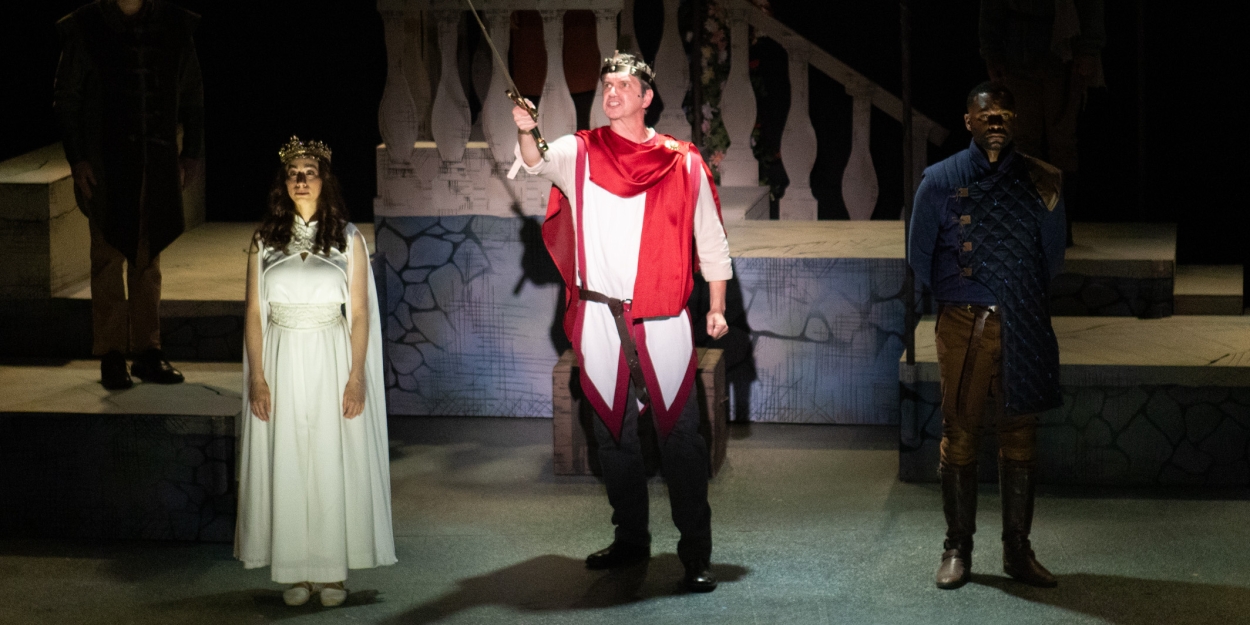
There's a certain magic to the legend of “Camelot,” a shimmering ideal of chivalry, justice, and a kingdom bound by the purest of intentions. This magic can be a daunting thing to capture onstage, especially when audiences familiar with the show expect a regal grandness to the production.
This summer, The Barnstormers production of Lerner and Loewe's "Camelot" takes the stage, not in a sweeping grandeur, but in a charmingly scaled-down rendition that proves intimacy can be just as captivating.
The grand themes still resonate powerfully within a more intimate play in what might be dubbed, “Camelot”-Lite.
The story tells the Arthurian legend of the formation of the Knights of the Round Table. The King imagines a more civil approach to warfare with a group of knights committed to good deeds and righteousness as opposed to slaughter and pillaging.
The story centers on the King (Rob Richardson) and his Queen (Stephanie Lynne Mason) who are confronted by a dashing Sir Lancelot (Todd McNeel) who vies for a place at the round table and the affections of the Queen. Theirs is a forbidden love that could lead to an early demise. The story details the strain on the love triangle made even worse by the appearance of the King’s long-lost son, Mordred (Jordan Ahnquist) whose mission is to cast revenge on his father.
Directorial choices are key in this adaptation. Instead of sprawling sets and a large cast, director Clayton Phillips focuses on the emotional core of the story. The set design by Eli Singer utilizes a central platform or two as the heart of Camelot, surrounded by a few regal banners and playful props for trees, jousting swords and the like. This minimalist approach allows the focus to shift entirely to the characters and their poignant interactions.
A sure sign of the reimagining begins with the costuming choices with actors in modern day street clothing that, with the addition of a period piece jacket or other garment, weaved the tapestry of Medieval times into the show. It was simple and it worked, thanks to costume designer, Alison Pugh.
The talented cast thrived in this environment. Richardson embodied King Arthur with an unbridled idealism and a touch of vulnerability that was both endearing and believable. His voice, clear and strong, brought a majesty to songs like "Camelot,” while he infused humor and melodic tones to “I Wonder What the King is Doing Tonight,” and “How to Handle a Woman.”
Mason as Guenevere has a captivating presence, her portrayal capturing both the queen's stoic grace and youthful charm. Mason is at her best in the numbers “The Simple Joys of Maidenhood,” “Before I Gaze at You Again,” and “What Do the Simple Folk Do?” Her scenes are at their best when paired with Richardson’s King Arthur.
McNeel as Lancelot has a commanding stage presence as the self-absorbed Sir Lancelot particularly in his rendition of "C'est Moi" an egotistical love story to himself. His “If Ever I Would Leave You,” a number that should have been a rousing showstopper, fell a bit flat on opening night with a few struggling notes. I wish, too, that the passion that grows between Lancelot and Guenevere would have been a bit stronger and more convincing.
The supporting cast delivered some impressive performances. As Mordred, Ahnquist portrays a captivating villain. His ambition simmers beneath a surface of charm, making his eventual betrayal all the more chilling. Audiences will recognize him from countless other shows at The Barnstormers.
The remaining ensemble members Alex Jorth, Giovanni Valforte, Brian C. Veith and Alan M-L Wager seamlessly shifted between roles, embodying knights or peasants all with infectious energy and solid vocals. Here’s a special call out to Valforte who creates a charming character that brings the show to an uplifting ending.
There were a couple of limitations to this scaled-down version. The iconic jousting scene is necessarily reimagined, relying on suggestion and offstage movement rather than elaborate choreography. The number, “The Lusty Month of May,” usually sung with a stage full of fair maidens, becomes a solo for Guenevere.
Music director, Michael Ursua infuses a powerful orchestral sound from a small group of musicians in the traditional pit area in front of the stage. The balance between orchestra and vocals was pitch perfect. And the show is a sure fire hit with the memorable tunes by Alan Jay Lerner and Frederick Loewe.
I was a bit confused with the lighting plot that went from odd colors to areas of darkness and then to brightly lit sections in a seemingly random fashion. It is not a big problem, just distracting.
Ultimately, The Barnstormers' "Camelot" is a triumph of storytelling. It reminds us that the power of theater lies not in spectacle, but in the ability to connect with the human experience on a profound level. This intimate production may not be the "Camelot" you remember, but it's one that will stay with you long after the curtain falls.
Reader Reviews

Videos

